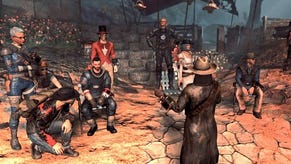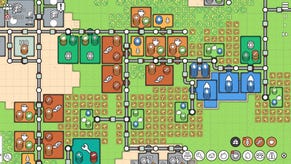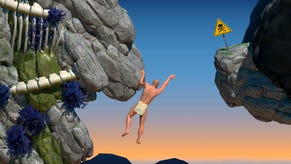To Sleep, Perchance To Game
Briefly mentioned in The Sunday Papers was a story about how dreaming can improve your gaming. It's a thought I wanted to expand upon further, pulling together a few stories that relate, and pondering some thoughts on the relationship between gaming and sleeping. I do this with no expertise, and a personal hatred of sleep itself.
Sleep is well loved. Most people either adore it or crave it. But I consider it an evolutionary failing, a dependency that wastes my time, and a source for only trouble. And I include dreams. If there were a button I could press that would switch off all dreams forever, I'd hammer on it with a fist. But I'd likely be a fool, because since it is an evolutionary failing, it's necessary. It's just, no one's exactly sure why, and what for.
There's some wonderful theories. And some remarkable facts. You need to sleep if you want your proteins to fold properly, it appears. And whatever restorative purposes it may possess, it seems that they accompanying dreaming is equally as important. What's perhaps more surprising is the role that videogames have played in the study of this phenomenon.
Dreams have been much ignored by science for a long time, beyond the realms of psychoanalysis. Considered to often to be the territory of psychics their woo-woo brethren is was rather improperly under-studied. That's been changing in the last couple of decades, with one of the more significant papers published focusing, rather peculiarly, on Tetris.
One of the reasons dreams have received so little scrutiny is their apparently random nature, making them extremely difficult to study in a useful way. But Robert Stickgold's paper demonstrated that there were simple ways to control what people dreamed about. By getting participants to play Tetris during the day, an approximate 50% (different reports state different numbers, unhelpfully) would report dreams of falling Tetris blocks. But you already knew that, right? As Stickgold said in an interview with NPR's RadioLab, he published one of the most significant papers on dream studies despite its stating something that everybody already knew. Play enough Tetris and you'll see it in your sleep.
As the Scientific American report of the study mentions, it was Stickgold who had previously published the paper demonstrating that dreaming plays a significant role in our ability to learn. This is a subject also studied by Giulio Tononi, who has demonstrated the ways in which some extraordinary activity during sleep can help us to sort information learned during the day, get rid of the noise, and leave us with more focused information in the morning. It's a theme picked up once more by Stickgold and others at a recent conference, one team in particular using the game Doom.
It's a natural consequence of all these previous studies, these discoveries that both dreams can be pre-decided if enough time is focused on an activity when awake, and indeed that in dreaming our brain is performing this sort of peculiar defragging of the day's information. Like a jumbled hard drive our heads are packed with new information, but not in a concise or clear pattern, with great amounts of wasted space. When we go to sleep we seem to run a defragmentation program, as information is passed back and forth between the hippocampus and neocortex, leaving us in the morning with the arranged information. Combine this all and you've got a theory that implies sleep and dreaming will improve your skills at a given activity.
Which seems to work with Doom. By getting volunteers to play Doom for a couple of days, then during their second night in the sleep lab interrupting their REM sleep to find out what they were dreaming about, Brazilian researchers Sidarta Ribeiro and André Pantoja of the Edmond and Lily Safra International Institute of Neuroscience of Natal were able to discern who was having the most Doom-related dreams. Then by comparing their ability at the game immediately after sleep with that from before, they looked at who showed significant improvement. The results aren't perhaps as clear-cut as some might like, but there appears to be evidence that at least some dreaming about Doom caused increased ability.
However, it seems that dreaming too much about Doom had a more negative effect. The seven players who showed the most improvement at the game had significantly higher Doom-based dream intrusion than the seven who dreamt about Doom the least. But those who reported the greatest amount of shotgun and demon dreams, the remaining eight, showed a more modest improvement.
"If you're too obsessed about something, you're dreaming about blood and monsters, you can't do well," was the thought from Ribeiro when reporting the results. As New Scientist reports, our old friend Stickland was at the same Chicago conference reporting some preliminary results showing that these improvements don't even require REM sleep, but just a short, lighter nap to be effective.
Perhaps some caution should be interjected here. As New Scientist concludes,
"Neither study proves that dreams cause improvement. Ribeiro admits that the people who dreamed about Doom most could simply have been those most motivated to improve. But he says dreaming and learning must be intimately linked."
However, when a layman like me looks at all these various studies there does seem to be an interesting pattern, that while perhaps not proven, does imply the possibility that dreaming can be a learning and refining phase for the brain.
Clearly I'm cobbling this together without any academic knowledge about the subject, but I encourage you to follow the links above, and the links they in turn contain, to read around the subject, especially here. And for a lighter, more accessible approach I heartily endorse listening to the episode of NPR's RadioLab that focuses on this subject, including interviews with Stickland. And you can watch Tononi lecture about the purpose of sleep here.
I detest sleep. I resent it. But it's been interesting to see some more involved reasons why I should welcome it. I've always considered dreams an opportunity for my brain to mess with me, largely unpleasant or sinister affairs when remembered. I'd still likely press that imaginary button, but the results could be catastrophic, it seems. It remains an evolutionary failing, a dependency developed by the first land dwellers they should have learned to shake off years ago. But I'll concede it has its purposes, and perhaps even offer the opportunity to be a better games player. Perhaps I should spend my evenings focused on playing as a healer, then see if I can shake off Kieron's insults the following morning.
PS. This post on my own blog provides an almost entirely irrelevant companion piece to this post.









